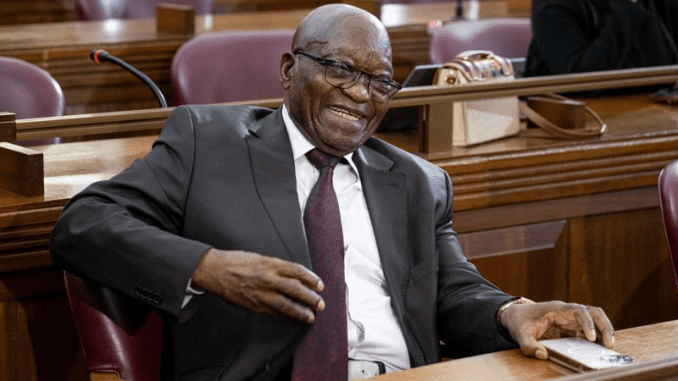
Less than two months remain until South Africa’s crucial election, and observers say scandal-plagued former president Jacob Zuma has made an unexpected comeback to steal the show and further damage the ruling African National Congress.
Zuma is arguably the most divisive politician in the nation’s democratic history, and his political maneuvering can be both fascinating and confusing.
The former leader, who has been in the news nearly every day in the country of southern Africa due to a string of political appearances and legal disputes regarding his eligibility to contest in the May 19 election, continues to dominate online and offline conversation.
Zuma unexpectedly said in December that he will run for a new party, uMkhonto weSizwe (MK).
The African National Congress (ANC), which is about to lose more than half of the vote for the first time since taking office in 1994, suspended him as a result.
Political analyst Susan Booysen told AFP that Zuma’s return “epitometizes his intense anger with the ANC… almost a revenge on a political party that he believes has alienated him.”
“So for his supporters the MK is a form of loyal revenge.”
When the 82-year-old was sentenced to 15 months in prison in June 2021 for refusing to testify before a tribunal looking into financial wrongdoing and favoritism during his presidency, many thought his career would come to an end.
Two months into his sentence, he was later released on medical parole; nonetheless, his imprisonment had provoked protests, riots, and looting, the worst violence South Africa had seen since democracy began, which claimed over 350 lives.
“Wounded lion”
But why does the well-known anti-corruption symbol still have such a strong following?
The politician frequently takes the lead in singing and dancing, drawing sizable audiences with his one-liners and jokes. He continuously uses his charisma to maintain his position of authority.
Even with all the scandals and accusations of corruption, Zuma is still well-liked, especially among the more than 10 million Zulus in the nation, who refer to him by the lovable clan moniker “Msholozi”.
The KwaZulu-Natal (KZN) province, where he is from, is a crucial election battlefield.
Author and sociologist Leslie Dikeni laughed slightly and remarked, “If his long-term objective is to become president again, that’s never going to happen, I mean the guy is old.”
“The objective here is to scatter the ANC and he is doing exactly that.”
After attempting in vain to get his MK banned, the ruling party filed a lawsuit to prevent it from using the MK moniker.
It was confiscated from the ANC’s defunct military wing, and they claim it is intellectual property.
According to Ongama Mtimka, a politics instructor at Nelson Mandela University, “his clinging onto power suggests fear to live as an ordinary citizen because he has seen the brunt of what it’s like to live as an ordinary citizen with his imprisonment”.
– Violence and threats –
Zuma was given permission to run by an electoral court on Tuesday, despite the electoral board’s disqualification from the May poll last month. a decision that the board has challenged.
“It will keep MK in the headlines and further unite the party around a narrative of persecution — a narrative fmr pres Zuma thrives on,” political analyst Sizwe Mpofu-Walsh wrote on X if the Constitutional court considers the appeal.
Members of the communist MK have vowed to cause trouble if Zuma is not included in recent months.
As Booysen conceded that it was “realistic” in light of the history, “they really trade on the threat,”
“But because… they are being scrutinised for this I think that reduces the chance of actual violence,” however, “there is a possibility” .
According to the most recent survey by the South African think tank Social Research Foundation, MK is predicted to be the second largest opposition party, with 13 percent of the vote, cutting into the governing party’s share of the vote. With 25% going to the official opposition, the ANC would receive 36% of the vote.
“Unlike last time, if violence happens again the army must act” Dikeni stated.
Leave a Reply